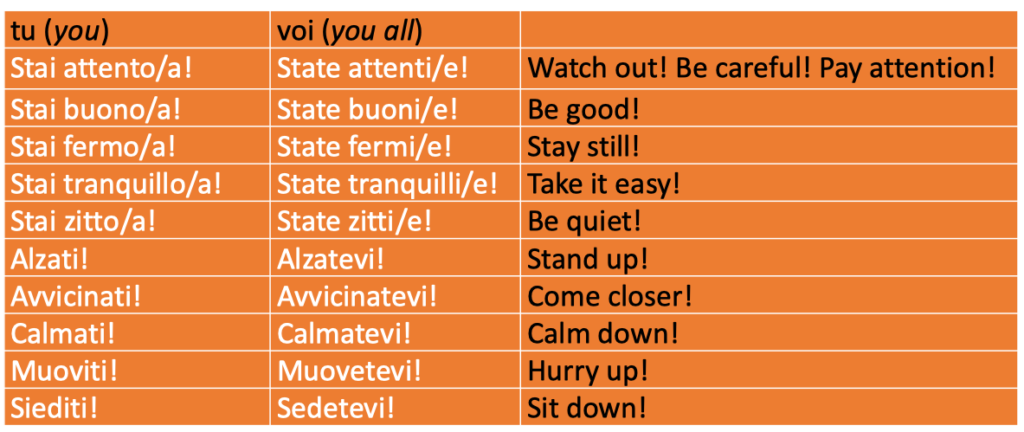Commands
| Read below a few tips to live a better life. Arrange them according to what you consider the order of importance. Click here for the translation.
|
When someone gives someone else’s advice (like in the sentences above), orders or instructions, the imperative form of the verb must be used. When reading or listening to an imperative verb, it could sound like the speaker is bossing someone around. In fact, this verb form doesn’t leave room for questions or discussion, even in sentences expressing requests in a more polite tone: Per favore, aspetta qui (Please, wait here), Gentilmente, non toccare la frutta (Kindly, do not touch the fruit).
| Some orders and warnings There are some short orders and warnings that in Italian and in English are not exactly equivalent. Some of them use the verb stare, others combine the verb with pronouns. Since they are very common it is a good idea to learn them as separate forms. For practice on their pronunciation, use Quizlet. (Note: On Quizlet, the imperative alzati, avvicinati, calmati are written with accents in order to pronounce them correctly. You will never have to write them with an accent).  Note: The words that combine with the verb stare (attento, buono, etc.) are adjectives and they must match the nouns they refer to in number and gender: Roberto, stai fermo! (Roberto, stay still!), Ragazze, state attente! (Girls, pay attention!). Note: The words that combine with the verb stare (attento, buono, etc.) are adjectives and they must match the nouns they refer to in number and gender: Roberto, stai fermo! (Roberto, stay still!), Ragazze, state attente! (Girls, pay attention!). |
| GRAMMAR
The imperative As usual, you make the imperative of regular verbs by adding endings to the verb stem, which is what is left when you take away the -are, -ere or -ire. We’re going to begin with tu (you). This is when you give commands, advice, or instructions to one person and you address them informally.
Note: verbs such of finire, pulire, etc. (see Unità 6.1) keep –isc– between the root of the verb and the ending i. For voi (you all) everything is extremely simple since for all regular verbs the imperative forms are identical to their present indicative forms (see Unità 3.2, 6.1): parlate, scrivete, dormite, finite, etc. The table below displays the imperative patterns for all regular verbs, using parlare (to speak), scrivere (to write), dormire (to sleep) and finire (to finish) as models.
The first plural person noi (we) can’t really have an imperative form, since we don’t command, or give advice to ourselves. By the way, in English, the phrase Let us/Let’s is often considered the first-person plural imperative2It is actually used to provide a hint from the speaker (which is included).. Don’t worry, the Italian equivalent is simply the first-plural person (noi ‘we’) of the present tense. So you translate let’s talk with parliamo, let’s write with scriviamo, let’s sleep with dormiamo, let’s finish with finiamo, and so on. Since the imperative sounds sharp and abrupt, it is only used in informal situations among friends, co-workers, relatives, or when addressing a child. For this reason, Italians use other forms for formal commands, that in case you will learn later. However, it is always a good idea to make a command less direct and blunt by adding polite phrases such as per favore, per piacere, per cortesia, ti prego (all equivalent to the English please). As usual, there are some Italian verbs that have irregular forms. You must memorize them. See the table below:
To express the negative imperative, while non is regularly placed in front of the affirmative voi forms ( Non parlate ‘Do not talk’, Non andate via ‘Do not go away’, Non abbiate paura ‘Do not be afraid‘, etc.) for tu instead the negative imperative is formed with non + infinitive form of the verb: John, non parlare (John, do not talk), Non andare via (Do not go away), Non dormire troppo (Do not sleep too much). Imperative with pronouns
In the case of the 2nd sing. negative form, the pronoun can precede the verb or be attached to the infinitive after dropping its final -e.
When the pronoun/particle attaches to the tu positive forms of dare, fare, andare, stare, and dire, the first consonant of the pronoun doubles, except with the pronoun gli: Dammi (give me), Fallo (do it), Vacci (Go there), Stacci (Stay there), dille (Tell her), but Dagli (Give him/them) Digli/ (Tell him/them), etc.:
|
Tasks
|
Practice
Previous > La particella Ci
Next > U19 Reading passages, songs, video clips, etc.
